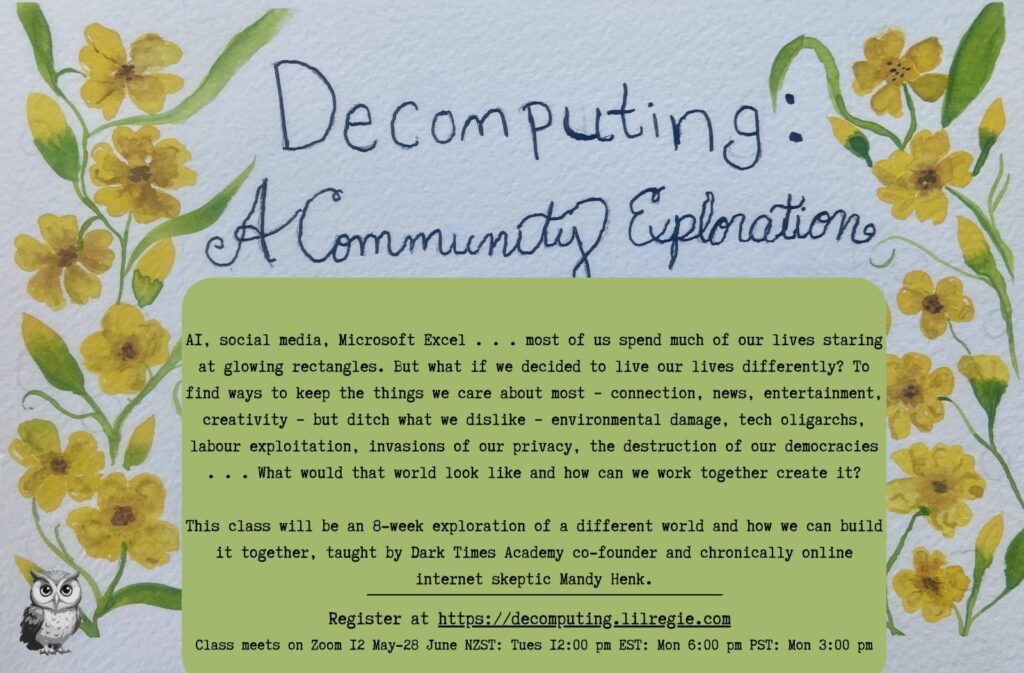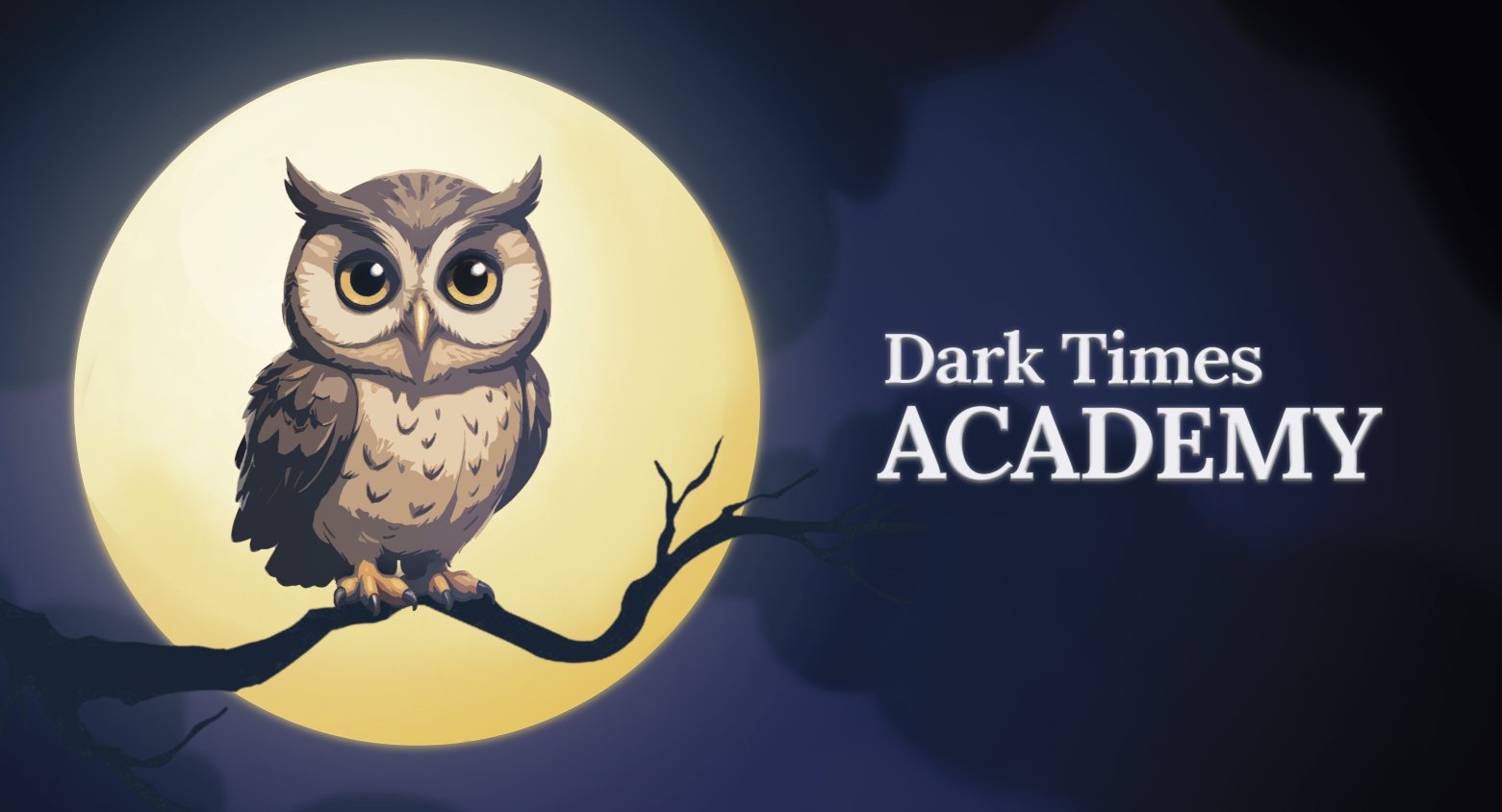
Register here.
How this course works
Taking inspiration from the long history around the world of folk education, particularly the Scandinavian and Appalachian traditions, this course is designed to offer a fun, affordable and rigorous experience–that serves the needs of working adults.
Like all folk education, liberation and movement building is at the core of the course. We save ourselves together–and we educate ourselves to build solidarity, share tactics, and create a shared vision for a better future for all of us.
There’s no grades, no assessments, no credentials.
This is about learning for the love of learning and the love of each other.
Course Objectives
- Explore the existing literature on decomputing–including the philosophical ideas behind it, the people already advocating for it, and the historical context around resistance to technology.
- Co-create alternative visions for how computing should be a part of our lives and how to manage the creep of the screen.
- Explore a wide range of alternatives to computers for meeting our need for information, entertainment, and creative outlets.
- Attend the 2025 LIMITS conference as a “node” and submit a paper as a group on what we learned together.
Instructor Info
Mandy Henk (mandy@darktimesacademy.co.nz) has been concerned about computers since she was a student library assistant tasked with tossing out old bound journals that were newly available on JSTOR. This seemed unwise to her back in 1998 and nothing in the decades since has changed her mind. Her 2014 book, Ecology, Economy, Equity: The Path to a Carbon Neutral Library (ALA) deepened her critical approach to technology and her years as CEO of Tohatoha Aotearoa Commons further cemented her interest in developing community-led alternatives to the current digital world. Mandy was a Luddite way before it was cool and still prefers her Freewrite to her MacBook and her physical copy of 1984 to the digital one that Amazon disappeared from her Kindle.
Course Dates & Session times
This class meets online once a week for activities, discussion, and guest lectures. If you can’t make it, we will seek consent from the group to record and share the lecture.
12 May – 28 June 2025
NZST: Tuesdays 12:00 pm
EST: Mondays 6:00 pm
PST: Mondays 3:00 pm
Course Tools
- Zoom, links will be sent out via email shortly before each class session begins
- Signal (optional)
We will be offering an optional “tech support session” early in the course so that you can ask questions, get help with Signal, and try out the tech tools we will be using.
Please come along if you need any help feeling comfortable with the tools we are using. If you aren’t comfortable with technology, please don’t worry! We will be happy to help you out and work to increase your comfort level.
Course Outline
Week 1: Why Decomputing?
This week we will explore the philosophical, political, economic, and practical reasons for decomputing. Starting with the work of Joseph Weisenbaum and branching out through David F Nobel, James Beniger and others we will discuss the historical context that gave rise to our current digital world–and explore the voices of those who resisted it.
Week 2: Connection and Communication
Our first practical session! This week we will explore how to maintain our connections and communicate in ways that aren’t entirely reliant on our computers and phones. From using the mail to storing printed photos safely, maintaining our connections to our community, to our past, and to our families is a lost art. We will look at what options exist now and also dream up new ones that we wish to exist.
Week 3: Computing and the Natural World
Is computing ecocide? With the rise of Generative AI, the environmental impacts of computing are in the spotlight. From cobalt mining in Congo to digital waste in Malaysia and everywhere in between, the companies who built our tech are making a big mess. This week we will explore the harms that computing is bringing to the natural environment – and how activists are fighting back.
Week 4 : Break! No lecture or class meeting
Week 5: Reading, writing, and listening
Getting the news and sharing our own writing is crucially important to us all, but getting and sharing news and information updates without a computer is a lost art with a dying infrastructure. This week we will explore how we get text and audio, how we consume it, and how we might reduce our reliance on our computers to know what’s happening. We will be looking at e-ink in particular and what role it might play in breaking us out of our computing habits.
Week 6: Computing and the rise of the far right
Elon Musk, Peter Thiel, and their band of neo-reactionaries combined with MAGA are in the process of tearing apart American institutions and rolling back progress. This week we will explore the relationship between computing, oligarchy, and the rise of the global far right. How much of this is rooted in the tech itself, how much in the political economy of tech? And what can we do to fight it?
Week 7: Creating joy without computers
Give us bread, but give us roses too! This week we will look at everything that brings us joy – music, art, TV, books – and explore how we can grow this part of our lives while reducing our dependence on computers. A freeform exploration that will be driven mostly by what interests the class, we will look at a range of alternative options for accessing the media we love and building safe collections that we actually own.
Week 8: A 21st Century Luddism
Labour abuses abound throughout the supply chains that bring us our computers and help keep them safe. This week we will look at the human cost of creating the digital world. Social media moderators, miners throughout the globe, the gig economy – what kind of world has tech wrought? And what are people doing about it?
Week 9: LIMITS 25 June 26th-27th 2025
For our final class, we will come together online to attend the 2025 Limits conference as a “node” and maybe even present our own paper as a class!
Model for Each Week and Expectations
Each week will include a 20-minute pre-recorded lecture and a 90-minute Zoom class session to discuss the material and engage in hands-on activities related to the course material.
We will also provide a list of resources including readings, podcasts, and videos for each week. You can choose to engage with these as we go along or save them for later.
Our goal is to provide readings at a range of levels, so if you struggle with reading or have other literacy barriers, you should still find plenty of learning material for you. You don’t have to be a reader to participate, and we aim not to privilege those with better literacy skills.
Code of Conduct
Our goal is to create a vibrant and engaged learning community where we all prioritise learning and building relationships with each. This course and all Dark Times Academy classes and events aim to be accessible to all people regardless of age, disability, sexuality, background, religion, gender or ethnicity.
A respectful, open attitude towards others is expected from all. Harassment of any kind will not be tolerated and may result in your removal from the course.
Life is hard enough as it is, leading with kindness and patience is key to a great learning experience, one that ensures all members feel welcomed.
Anxiety, Busyness, and Stress
Doing an online course on top of your full-time job, care responsibilities, and other life stuff is really hard. It’s ok to fall behind! Please don’t let anxiety or stress lead you to avoid engaging or cause you to feel inadequate.
Do your best, it will be good enough. Ask for help if you need it. We are always happy to support you as best we can.
Accessibility
Please email Mandy with any accessibility needs. We are happy to work together to make this class work for you
